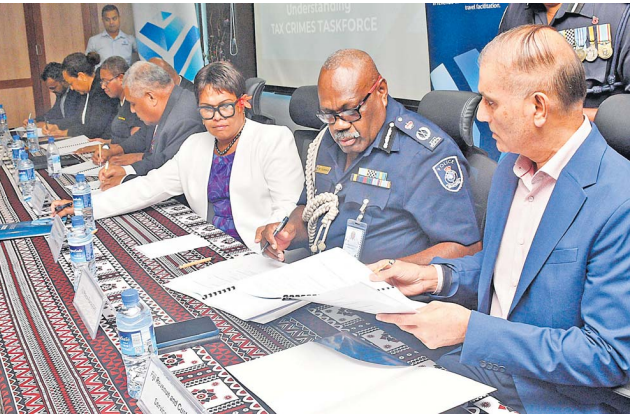THE signing of a new Memorandum of Understanding (MOU) between key government agencies will strengthen the Fiji Police Force’s ability to investigate complex financial crimes.
The agreement brings together the Police Force, Fiji Revenue and Customs Service, Immigration Ministry, Financial Intelligence Unit, Justice Ministry, the office of the Solicitor-General, FICAC and the Land Transport Authority.
At the signing of the Tax Crimes Task force MOU, Police Commissioner Rusiate Tudravu said the agreement would improve information-sharing and coordination between agencies, an area that had previously posed challenges for investigators.
“This is one of the areas that has been a challenge for us; collaboration and the passing of information which is vital to any investigation,” he said.
“The set-up of the task force allows people to come forward, like a whistleblower process, and once information is verified, it can be passed to the police for further investigation.”
Mr Tudravu said the initiative would help detect cases of tax evasion, unexplained wealth and money laundering.
“Some people try to outsmart the system, but through this partnership, the data and systems used by Customs and Revenue will help identify those involved.
“It will increase the number of investigations we do, but it is a good thing – a best practice measure.”
Mr Tudravu said the public and investors could have greater confidence knowing there is a coordinated system in place to tackle corruption and financial crimes.
“It gives confidence because we now have a process that cuts out corruption and money laundering,” he said.
“Those trying to operate outside lawful business practices can now be detected.”
ODPP welcomes inter-agency collaboration
ACTING Director of Public Prosecutions Nancy Tikoisuva says the newly signed Tax Crimes Taskforce Memorandum of Understanding (MOU) will strengthen coordination between agencies while maintaining the independence of the Office of the DPP.
The MOU was signed between the Fiji Revenue and Customs Service (FRCS), Fiji Police Force, Financial Intelligence Unit, Ministry of Immigration, Ministry of Justice, Solicitor-General’s Office, the Land
Transport Authority, and FICAC.
Ms Tikoisuva explained that the ODPP’s role is not investigative but prosecutorial.
“What most people don’t understand is that we are not an intelligence agency or an investigating body, which is slightly different from FICAC,” she said. “We are purely a prosecution body.”
She said while the MOU creates a framework for inter-agency information sharing, the ODPP would become involved only at the conclusion of investigations.
“When the investigating agencies complete their work, that’s when the matter comes to us for prosecution.”
Ms Tikoisuva said the deal marks a step towards improved collaboration among key institutions.
“At the end of the day, it’s about intelligence and evidence.
“For us, we provide advice on the preservation of evidence, ensuring that investigators obtain it lawfully and that it is presented properly in court.”
Monitoring people movement critical
THE Ministry of Immigration will play a key role in monitoring the movement of people across Fiji’s borders under the newly established Tax Crimes Taskforce.
Permanent secretary Aliki Salusalu said the ministry’s role is to ensure every person entering or leaving the country is properly cleared, while its partner agencies focuses on cargo and financial transactions.
“Our responsibility is to make sure that every person crossing the border is clean,” he said. “If there are any links between people movement and money laundering, our job is to identify that and work with the taskforce to investigate.”
Mr Salusalu said the ministry’s work aligns with the International Civil Aviation Organization (ICAO) standards under Annex 17 on Security and Annex 9 on Facilitation.
Annex 17 sets out global measures to prevent unlawful interference with civil aviation, such as terrorism or smuggling, while Annex 9 focuses on simplifying and aligning procedures for border control to ensure the efficient flow of people, goods, and aircraft.
“These two annexes complement each other,” Mr Salusalu said.
“One strengthens security while the other ensures smooth facilitation.”



